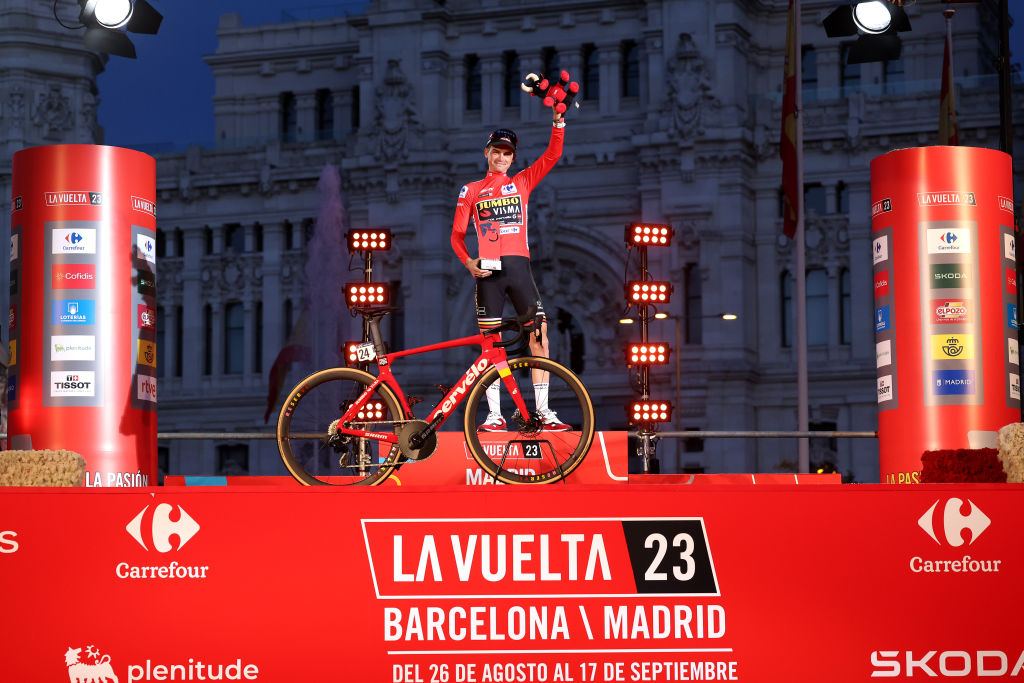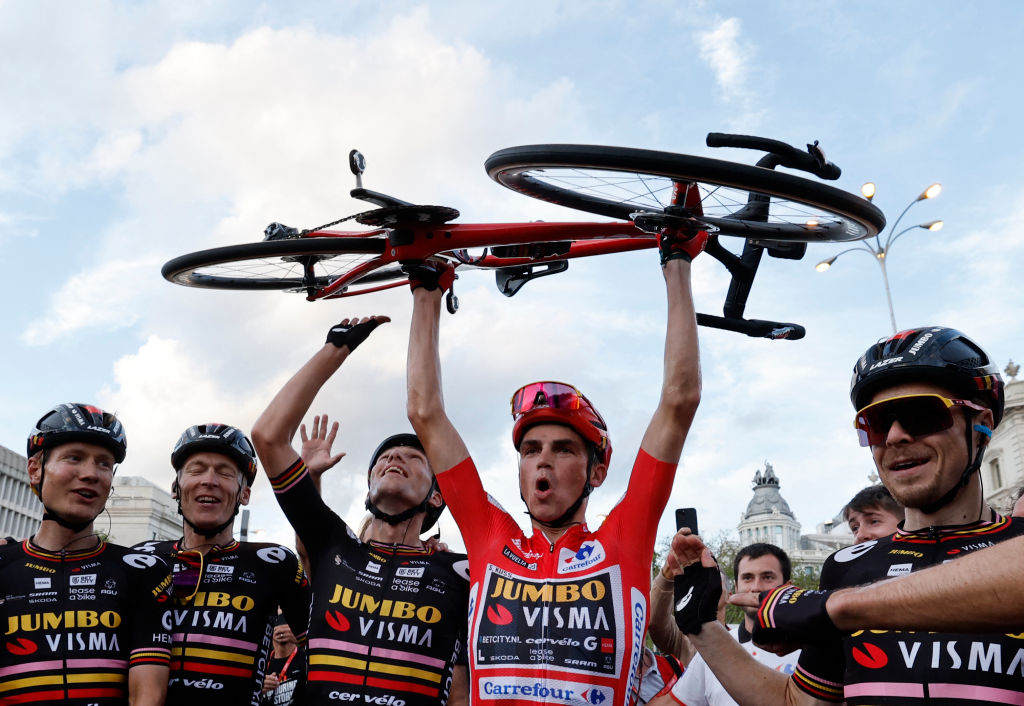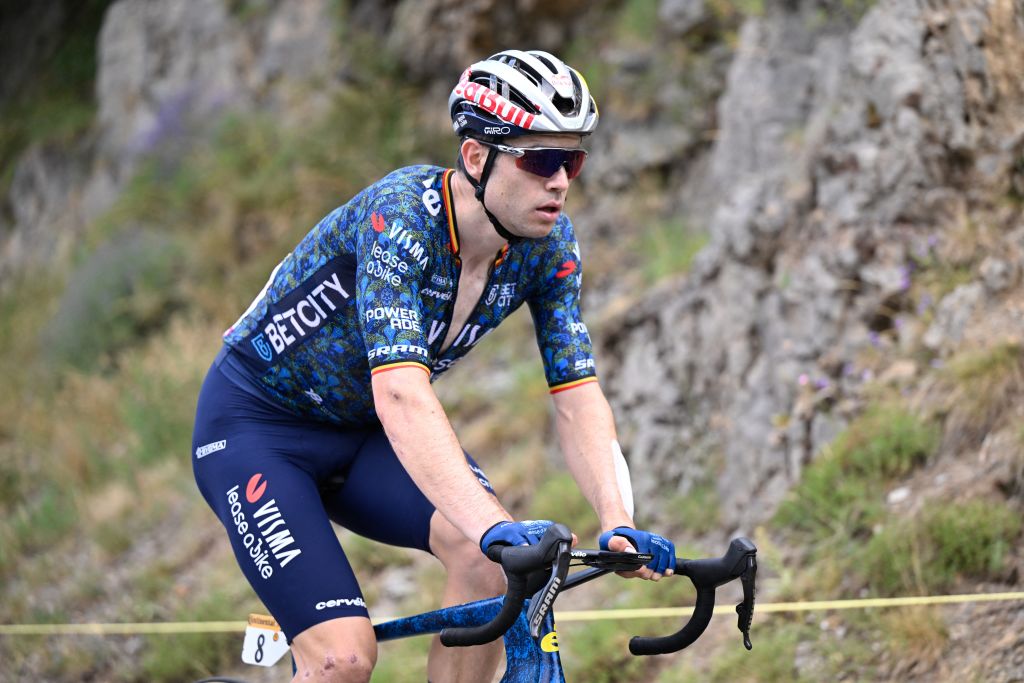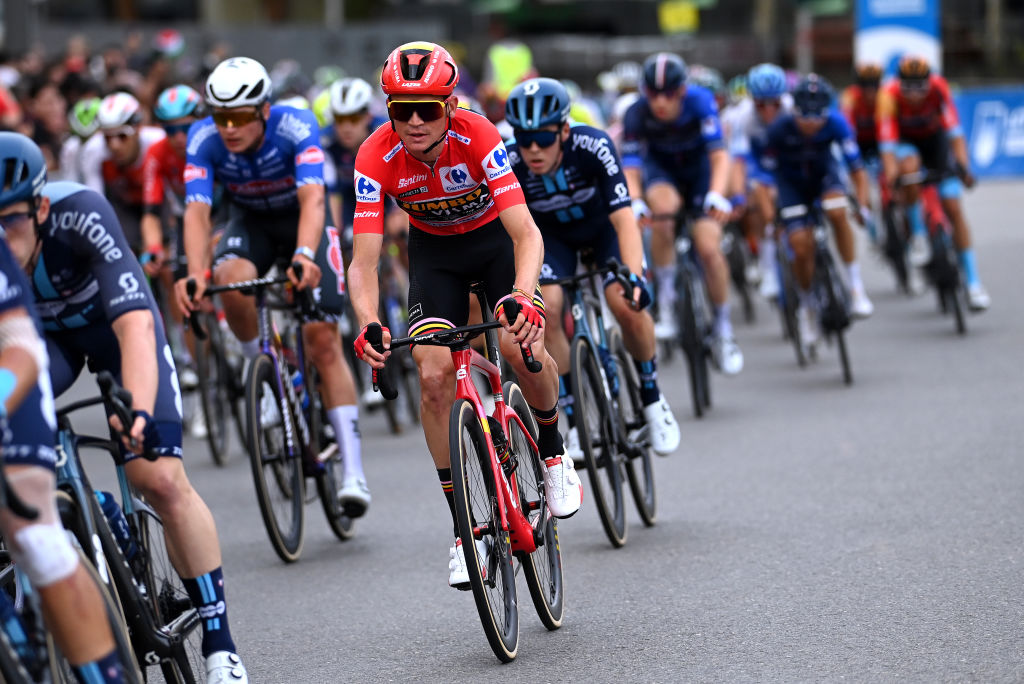Power vacuum makes Vuelta a España the most unpredictable Grand Tour of the season – Analysis
Absence of Evenepoel, Vingegaard and Pogačar creates conditions for a hugely compelling race

When Vuelta a España director Javier Guillén recently made a public plea to UAE Team Emirates to include young contender Juan Ayuso in their line-up for the 2024 race, it unintentionally cast a spotlight on a broader leading question: who is most likely to make the running in the last Grand Tour of this season and who will be completely missing from the equation?
In some ways, with or without Ayuso, it’s the absences that define the broader outline of the 2024 Vuelta a España. First and foremost, after crushing the opposition first in the Giro d’Italia and then in the Tour de France, Tadej Pogačar’s longstanding decision not to go for a ‘Grand Slam’ means the current dominator of the Grand Tours will not be present in La Vuelta.
But despite Pogačar's tendency to eclipse the opposition in every race he starts right now and the increasingly frequent comparisons to greats of the calibre of Eddy Merckx, the list is a lot longer than that. For one thing, the absence of the two other podium finishers this July in Nice, Jonas Vingegaard (Visma-Lease a Bike) and Remco Evenepoel (Soudal-QuickStep) further expands the power vacuum at the top of the Vuelta GC tree.
After all, Vingegaard is not only the winner of the 2022 and 2023 Tours, he finished second last year in the Vuelta as well. As for Evenepoel, he captured both the Vuelta a España overall in 2022, and three mountain stages and the KoM classification - this despite a notable GC collapse in the Pyrenees - in 2023.
No disrespect intended, but it’s impossible for defending champion Sepp Kuss (Visma-Lease a Bike) to wholly fill the power vacuum left by this trio of Grand Tour aces while the ongoing uncertainty surrounding Primoz Roglič's participation is a reminder of the equally large question mark surrounding the Red Bull rider's underlying condition.
Currently on the comeback trail from a brutal injury this July in the Tour, past history suggests the Slovenian veteran would be more than capable of bouncing back into the arena at the Vuelta after a tough summer - witness the events of 2020, 2021 and 2022. But after missing one possible warm-up race, the Clasica San Sebastian on Saturday, even if he does make it to Lisbon, the reality is the current state of his form remains completely uncertain.
As for Kuss, after missing the Tour de France completely because of COVID, his current status as top favourite is held by a relatively narrow gap, hinging as it does almost entirely on last year’s overall victory and a recent stunning win in the Vuelta a Burgos. His stage racing GC record is very impressive in terms of quality, but it's (as yet) a very short one. That lack of experience in handling GC scenarios could prove important in a race which, unlike in 2023, will likely not have a single team containing Kuss dominating proceedings almost from beginning to end and is likely to be much more in a constant state of flux.
The latest race content, interviews, features, reviews and expert buying guides, direct to your inbox!
Kuss does other points in his favour: for one thing, compared to the shenanigans of the last week of the 2023 Vuelta a España where the crushing superiority of Jumbo-Visma all but backfired for Kuss, the internal power politics are far more clearcut for the American this time around. Kuss' first victory of 2024 at Burgos has reminded the world how dangerous a climber the Durango-born rider can be when in form. But it's also true that when the Vuelta rolls out of Lisbon next Saturday, Kuss will be much more of a marked man than he was when the race left the start city of Barcelona last August - and his room for manoeuvre correspondingly that much more limited.
Last year, in fact, Kuss managed to fly under the radar until it was too late for his rivals to do anything, most notably when he turned an innocent-looking midweek break into an unsuspected major foundation stone for overall victory. It's true that Kuss now knows that he has the wherewithal to go the distance and conquer a Grand Tour and his confidence will be correspondingly higher. However, it's equally undeniable, that if Kuss is going to win this time round, with his rivals far more alert to his potential, he'll need a very different strategy to 2023.
Globally, it could be argued that the two crunch pre-race questions of the 2024 Vuelta are the will-he/won’t he saga surrounding Roglič’s participation and whether Kuss can handle the heightened pressure from day 1 of being a leading contender. But no matter how those questions play out, in no way do Kuss or Roglič stand head and shoulders above the rest of the contenders in the way that Pogačar did, say, in the countdown to the Giro d'Italia.

Who's in the running
But is this such a bad thing in terms of spectacle? The absence of Pogačar, Vingegaard and co, and the question marks surrounding Roglič should combine to make the Vuelta a standout opportunity for the outsiders in any other grand Tour. The Vuelta looks set to be a very different kettle of fish to the Giro and Tour, and among the best-known contenders are the UAE Team Emirates duo Adam Yates and Joao Almeida, both of whom were instrumental in laying the groundwork for teammate Pogačar in July.
Others seeking to repeat their already top-grade 2024 Tour de France performances include 2019 Giro d’Italia winner Richard Carapaz (EF Education-EasyPost), winner of a Tour de France stage and the king of the mountains, as well as Mikel Landa (Soudal-QuickStep), fifth overall. Cast your mind back to May, too, and Red Bull-Bora-Hansgrohe's Dani Martínez and Australia's Ben O'Connor (Decathlon-AG2R La Mondiale) were significant GC factors in the Giro d'Italia battle, placing second and fourth respectively.
Yet while all of these contenders are aware that this is an increasingly rare chance to get their name in the Grand Tour history books alongside the Pogačars and Vingegaards of this world, none of them are seemingly automatically a level or three ahead of the rest, as is the case for the Slovenian and Dane. (A quick glance at the Tour de France GC rankings, with Vingegaard 13 minutes ahead of fourth-placed Joao Almeida, the top Vuelta a España contender in July, confirms this). As a result, this much more level playing field means the Vuelta could well end up being by far the most interesting Grand Tour of 2024 from a tactical standpoint.
The atmosphere of unpredictability surrounding the 2024 Vuelta is considerably helped by the fact that few riders have specifically prepared for the Vuelta and for many (like Adam Yates, Carapaz, Landa, Martínez and O'Connor) the Spanish Grand Tour will be their second of the 2024 season. As the end of the year looms, the chances of a sudden drop in form, then, or an abrupt and unbearable rise in fatigue levels, particularly in the Vuelta's ultra-difficult second half, are correspondingly higher. It's true that racing three Grand Tours in a single year did no harm whatsoever to Kuss' chances in 2023, but this time out, he has the considerable advantage, in terms of race freshness at least, that La Vuelta is his first Grand Tour of the season.
There are few hiding places in the Vuelta for those seeking to 'ride into form', too, for all the 2024 route is not unnervingly difficult in its first week as 2023, which featured a significant incursion into the Pyrenees on stage 3. At 12 kilometres the opening TT in Lisbon is far too short to do more than establish a nominal hierarchy. But could well change as soon as stage 4, when the peloton face the first major summit finish of the race, the grinding 14-kilometre ascent of Pico Villuercas.
Being not excessively difficult, Villuercas’ most likely role will be the classic one for an early GT summit finish of weeding out those potential contenders who are short on form, rather than establishing a clear leader. Stage 9 through the foothills of Sierra Nevada, though, which includes a double ascent of the dreaded Hazallanas climb in blazing Andalusian August heat, could well provide a much more serious sortout of the same calibre. But whoever gets into the Vuelta transfer plane on the first rest day wearing the red jersey of leader for the two-hour long, 1,000 kilometre flight north, (spare a thought for those members of the Vuelta caravan who are obliged to drive) the real climbing challenges though, will come from halfway through the second week onwards.
Containing six of the nine summit finishes, ascents of the Ancares on stage 14, Cuitu Negru on stage 15, the Lagos de Covadonga on stage 16 and Moncalvillo on stage 19 and Picón Blanco on stage 20 - all of them category 1 or higher - will doubtless help maintain the GC suspense. That's a very different story to the Vuelta of 2022, say when the overall battle was all but over by the start of week 3, or in 2023 - when, barring the precise order of the Jumbo-Visma riders at the head of the classification - everything had essentially been decided by the summit of the Tourmalet on stage 13.
This time, though, the Vuelta has everything going for it to ensure a different plot line, and one which would be very much in keeping with its tradition of unexpected winners. In the last 15 years alone, when it comes to unexpected triumph, we've witnessed Vincenzo Nibali and Chris Froome’s maiden Grand Tour wins in 2010 and 2011, Alberto Contador’s devastating ambush at Fuente De in 2012, outsider Chris Horner ripping the race apart at Hazallanas in 2013, Fabio Aru upsetting Tom Dumoulin's clearcut pathway to victory in the sierras of Madrid in 2015, Simon Yates' sole Grand Tour win to date in 2018 and Kuss himself making a breakthrough in 2023. Put it all together, and it's hard to disagree that one of the Vuelta’s most enjoyable features is its potential for major surprises to materialise and new names to emerge.

What can Wout van Aert achieve in the Vuelta?
With that 'surprise factor' in mind, one of the biggest unknowns of the Vuelta a España will be the debut of Wout van Aert (Visma-Lease a Bike) at the race. The Belgian signalled his intention to ride the Vuelta last winter, and the Belgian has stuck with the idea, despite the heavy crash at Dwars door Vlaanderen that ruined his Spring and forced him to miss a planned Giro d'Italia. Instead, Van Aert returned to the Tour and he then claimed a bronze medal in the time trial at the Paris 2024 Olympics.
As with the Tour, Van Aert’s plans for solo stage glory may well be conditioned by what his GC leader - in this case Sepp Kuss - can achieve. Furthermore, the as-yet unspecified goals of teammate, fellow-Belgian and possible GC contender Cian Uijtdebroeks could also affect his opportunities. Team duties notwithstanding, there are plenty of chances both for breakaways and bunch sprints on tough terrain, as well as the potential for Van Aert to remind us of his considerable time trialling talents. Indeed, if Van Aert does well in the opening race against the clock, he could follow in compatriot Remco Evenepoel’s wheeltracks and even end up having a spell in the lead of the Spanish Grand Tour.
It's worth remembering, too, that Van Aert will also be using the Vuelta to build for the World Championships on both road and gravel. That’s a strategy which has become increasingly rare, compared to the late nineties and early noughties where multiple candidates for the rainbow jersey would get in a couple of weeks of racing in Spain before quitting.
But regardless of whether he makes it to Madrid, what Van Aert gets up to can hardly fail to be a major interest point. The same goes for compatriot and veteran breakaway specialist Thomas De Gendt (Lotto-Dstny), set to celebrate his 500th day of Grand Tour racing on stage 20 of the 2024 Vuelta, and surely aiming to go out on a high note in his retirement season at some point along the way.
Rigoberto Urán (EF Education-EasyPost) is yet another star name using the Vuelta as his swansong, while at the other end of the spectrum, interest will be high in what Isaac del Toro (UAE Team Emirates), the precociously talented young Mexican, can achieve in his first Grand Tour. Likewise, British TT ace Josh Tarling (Ineos Grenadiers), three months Del Toro’s junior and barely out of his teens himself, will doubtless be making the most of the Lisbon time trial. So, too, will Brandon McNulty (UAE Team Emirates), who recently did not hide his deep disappointment at missing out narrowly on an Olympic time trial medal at least.
This mixture of radically different personal goals and backstories is perhaps what makes the Vuelta the most colourful of all three Grand Tours. For some, the Vuelta a España is a last-chance saloon in a quest for a new contract or to make it into the WorldTour while for others, it represents an opportunity to put a skewed season straight or revive optimism after a poor Tour de France. (As Eusebio Unzue, the veteran Movistar team manager, once famously put it, ‘the Vuelta in September is a chance [for riders] to re-sit the exams they failed in July’.)
For yet others, the Vuelta a España is the first step towards future Grand Tour greatness, as it was with Tadej Pogačar in 2019, while the more established stars, given the vacuum of power at the very top of that ranking in the Vuelta, will be keen to remind the cycling world that should anybody falter, they will be ready to take up the reins of power in an instant.
Enjoy it while it lasts, mind. Tadej Pogačar has already hinted strongly that after a six-year-absence he will return to the Vuelta a Españ in 2025, and on current form, the risk he would turn the Spanish Grand Tour GC battle into an exhibition race is not a small one. In 2024, though, it's very much up to the best of the rest to grab their chance to shine in Spain.

Get unlimited access to all of our coverage of the 2024 Vuelta a España - including breaking news and analysis reported by our journalists on the ground from every stage as it happens and more. Find out more.
Alasdair Fotheringham has been reporting on cycling since 1991. He has covered every Tour de France since 1992 bar one, as well as numerous other bike races of all shapes and sizes, ranging from the Olympic Games in 2008 to the now sadly defunct Subida a Urkiola hill climb in Spain. As well as working for Cyclingnews, he has also written for The Independent, The Guardian, ProCycling, The Express and Reuters.
